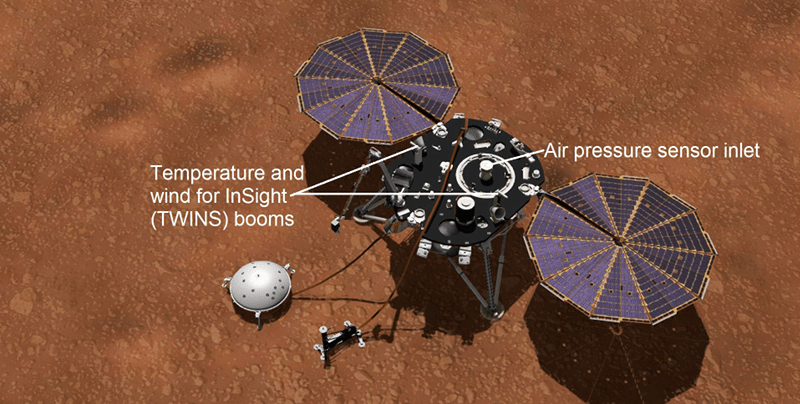NASA’s latest Mars lander has a very precise weather package, and you can check the daily conditions on Elysium Planitia online. The data however has apparently led to a bit of a mystery. According to Ars Technica, every day at 7AM and 7PM local time, there’s an unexplained atmospheric pressure spike.
The TWINS (Temperature and Wind for InSight) package provided by Spain’s Centro de Astrobiología shows the little spikes regularly since the lander hit the ground in November. They seem to correspond to local sunrise and sunset. Keep in mind, the pressure on Mars is very low — about 1% of Earth’s atmosphere — and scientists have already ruled out instrument problems.
The technical side of TWINS includes thermometers, as well as an anemometer to measure wind speed and direction twice per second. Additional sensors include the InSight FluxGate (IFG) magnetometer provided by UCLA to measure the direction and magnitude of magnetic fields; and a highly sensitive barometer from JPL. The sensors have picked up a few mysteries including an unexplained “infrasound.” You can read more about the weather station on NASA’s website.
Proving that social media is everywhere, the lander has its own Twitter account and posts little selfies and tidbits about its day. If you want to hear what the lander hears, you might enjoy the NASA telecon recorded in the video below.
We looked at InSight last year in some detail. Before you start planning your next vacation to Elysium Planitia, you might want to read this.

















Is there movement of air from hot side to colder side and back? How about mass surface sand movement (infrasonic)?
You’d think Venturi effect would make the opposite happen though.
Those pressure spikes are caused by flocks of Martian birds landing in the near vicinity to feed on worms that come up to the surface at those times of day. They all land at roughly the same time but take off again more randomly.
Martian farts?
Wow, 2.3Billion to know which way the wind blows. Now that’s good bang for buck. Thanks NASA for pissing my tax dollars away on trivial useless information that will help us here on earth.
Really? The money was spent on earth, people were educated and employed developing the technology, and that technology finds its way to the consumer market where it is used to improve existing products or enable new products. Long term: learning about Mars is the first step to unknown benefits, yes, a gamble.
People really do have to educate themselves on how government spending works.
Trickle down science!
Actually I agree with your statement but the phrase “how government spending works” seems kin to “how a perpetual motion machine works” ..sounds great in principle but when the rubber hits the road it’s another thing. :-) Usually government waste is the second crime after the first crime where they extort money from the citizens.
+1
You obviously never worked in a large company. Usually big corps waste is the second crime after the first crime where they extort money from the “customers”
“Shockley! Pearson! Why are you wasting Bell Labs’ capital on your ridiculous quantum-field-effect-whatsit experiments? It’ll never benefit anybody, now get back to work on those triodes!”
Of course. Knowing which way the wind blows in a foreign environment is important to staying to the right side of any politics.
When your great-great-great grandchildren are living on Mars they’ll think “Boy we’re our ancestors smart to research our planet so thoroughly before we settled here!” Well unless HaD is still up in 200 years when they’ll think you was an idjit.
are they using freescale pressure transducers?